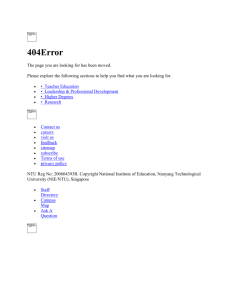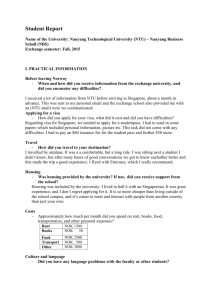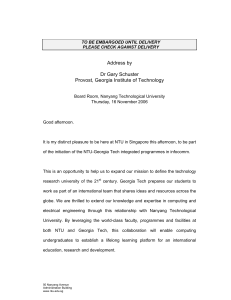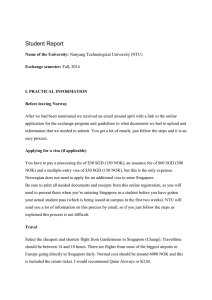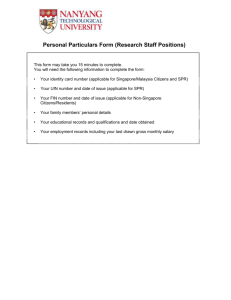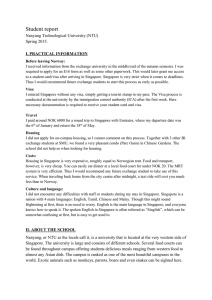Student Report
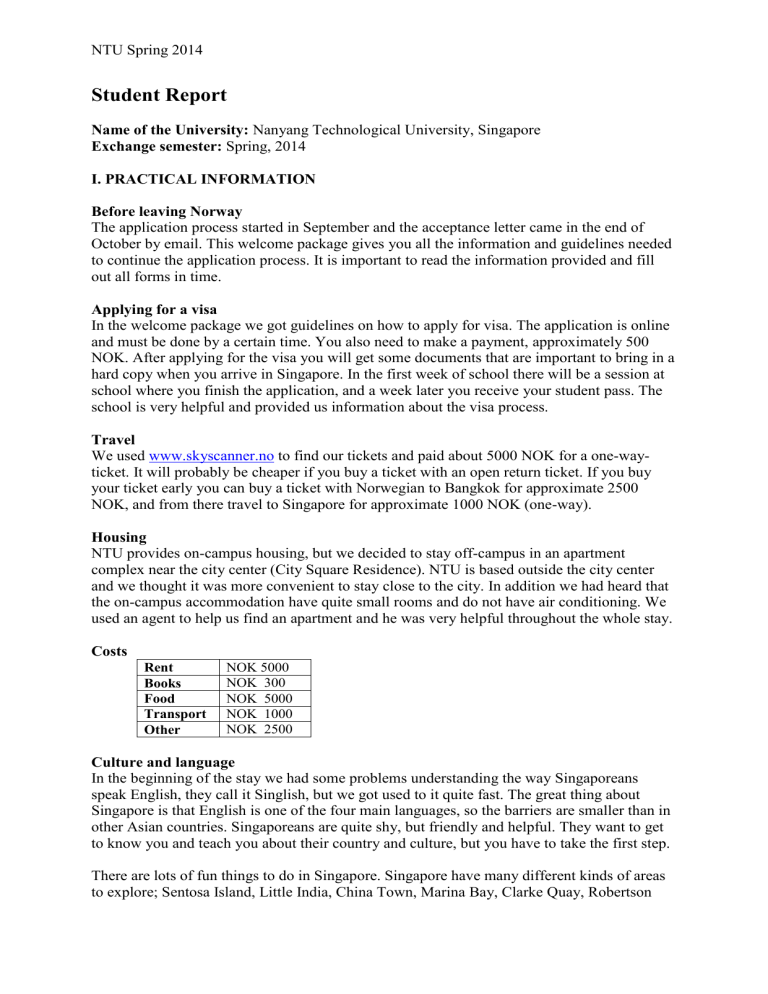
NTU Spring 2014
Student Report
Name of the University: Nanyang Technological University, Singapore
Exchange semester: Spring, 2014
I. PRACTICAL INFORMATION
Before leaving Norway
The application process started in September and the acceptance letter came in the end of
October by email. This welcome package gives you all the information and guidelines needed to continue the application process. It is important to read the information provided and fill out all forms in time.
Applying for a visa
In the welcome package we got guidelines on how to apply for visa. The application is online and must be done by a certain time. You also need to make a payment, approximately 500
NOK. After applying for the visa you will get some documents that are important to bring in a hard copy when you arrive in Singapore. In the first week of school there will be a session at school where you finish the application, and a week later you receive your student pass. The school is very helpful and provided us information about the visa process.
Travel
We used www.skyscanner.no
to find our tickets and paid about 5000 NOK for a one-wayticket. It will probably be cheaper if you buy a ticket with an open return ticket. If you buy your ticket early you can buy a ticket with Norwegian to Bangkok for approximate 2500
NOK, and from there travel to Singapore for approximate 1000 NOK (one-way).
Housing
NTU provides on-campus housing, but we decided to stay off-campus in an apartment complex near the city center (City Square Residence). NTU is based outside the city center and we thought it was more convenient to stay close to the city. In addition we had heard that the on-campus accommodation have quite small rooms and do not have air conditioning. We used an agent to help us find an apartment and he was very helpful throughout the whole stay.
Costs
Rent
Books
NOK 5000
NOK 300
Food NOK 5000
Transport NOK 1000
Other NOK 2500
Culture and language
In the beginning of the stay we had some problems understanding the way Singaporeans speak English, they call it Singlish, but we got used to it quite fast. The great thing about
Singapore is that English is one of the four main languages, so the barriers are smaller than in other Asian countries. Singaporeans are quite shy, but friendly and helpful. They want to get to know you and teach you about their country and culture, but you have to take the first step.
There are lots of fun things to do in Singapore. Singapore have many different kinds of areas to explore; Sentosa Island, Little India, China Town, Marina Bay, Clarke Quay, Robertson
NTU Spring 2014
Quay, Malay Area, Club Street and Haji Lane. Singapore has everything; beaches, clubs, restaurants, cafés and everything else that belongs in a big city.
II. ABOUT THE SCHOOL
Please describe:
NTU is located near the border to Malaysia. To the city center it takes about 45 minutes to one and a half hours by bus and MRT depending on where you want to go. NTU is a very large university that consists of many smaller schools. We mostly stayed in the business building, Nanyang Business School (NBS). At the school you find everything you need; multiple food courts, cafés, a doctors office, a gym and much more.
The Singaporeans enjoy studying and will occupy the library from the early hours until late.
During the semester there are many small assignments that need to be done (essays, quizzes and oral presentations). The exams do not usually count more than approximately 40 % of the total grade depending on the different teachers and class structures.
There are a lot of other exchange students at NTU. We had a hard time getting to know them since we were living off-campus. Those who lived on-campus had a great social life and got friends from all over the world. They travelled together, went clubbing together and were studying together. Since we lived off-campus, near Singapore Management University
(SMU), we lived in the same residence as many other exchange students from other schools in
Singapore.
Course registration
As a part of the application process, you need to choose ten courses of which you need to take four (given that each course has a value of 4 AU = 7,5 studiepoeng). When we arrived in
Singapore we had only been accepted to one course, and spent the two first weeks (the add/drop period) hoping that we would get three more courses. However, the waiting list was long and all we got was one more course during this add/drop period. The undergraduate office was a great help in getting signed up for the two courses that we still needed to take in order to get the semester approved at BI. As we have tried to explain, getting the courses you want can be tricky and you constantly need to check the waiting list and talk to the undergraduate office at the business school to get help and advise on how to proceed during the add/drop period.
Academic calendar
Arrival date:
First day of the semester:
Last day of classes:
28 th of December 2014
9 th of January 2014
18 th of April 2014
28 th of April – 9 th of Examination period:
May 2014
Any special events/holidays: Recess week: 3 rd -7 th of
March 2014
Arrival
On the 9 th of January 2014 we had a lunch with all the exchange students who were attending
Nanyang Business School. This was a social get-together that focused on us getting to know each other. On the 10 th
of January we had an information meeting about the campus, courses
NTU Spring 2014 etc. There were many different events you could attend the first weekend, like sightseeing and dinner with other exchange students.
The International Office
When we got accepted as exchange students at NTU we got our own accounts in the student network at NTU, similar to atbi.no. Here we received information about courses, and we could communicate with the teachers and other students. The international office sent us reminders of things we needed to do as exchange students, i. e. about the student pass application and termination of the student pass.
Social activities
There were several social gatherings for exchange students like barbeques and other events.
Since we stayed in the city, quite a bit from the school, we were not able to attend all of the gatherings and for us most of the social activity was in class. We made some local friends in different study groups and there were several events outside campus were many fellow students attended, i.e. hanging out at the bridge at Clarke Quay.
III. ACADEMICS
In the classroom
The teaching style at NTU was quite different from BI. The classes usually consisted of 30 students and we had seminars that lasted four hours every week. One of our courses was similar to BI with lectures in an auditorium, but we also had tutorials in smaller groups that required a lot of participation. The teachers used power points and posted them before class so that we could prepare. During the semester we had a lot of smaller assignments like quizzes, presentations, essays and group projects. Our final grade was a result of these, together with participation and attendance in class, homework and final exams. The workload was comparable to BI, but we had to work regularly throughout the whole semester, especially on group projects.
Course materials
The course materials were different from every course. In some of the courses we needed to buy literature books, in others we used handouts and online articles. Pretty much all of the teachers used power points as a teaching tool.
Exams
The final grade was evaluated by: o Final exam (include form: written, oral, home assignment, presentation, etc.) o In-class quizzes throughout semester o Small assignments and/or papers o Presentations o Group work o Class attendance o Class participation/debates
Library and technology
NTU is a very modern school similar to BI. We used the net portal for communication and information exchange between the teachers and the administration. All of the submissions
NTU Spring 2014 happen through this net portal as well. The facilities for studying are excellent and you have access to a lot of literature and tools.
Description of courses
Course code & name Master/
Bachelor
BF2207 International
Finance
Bachelor
Exam form
2-hour written exam
Prerequisites Approved as
None Elective
Comments
BM2503 Marketing
Relationships
BM3505 Services
Marketing
HS207 Understanding
Globalization
Bachelor 2-hour written exam
Bachelor 2.5-hour written exam
Bachelor 2.5-hour written exam
None
None
None
Elective
Elective
Elective
The importance of marketing in service related businesses.
Cultures, economy, languages and other elements that brings the world together.
A mix of macro and finance, learned a lot about exchange rate theories and internationa l finance barriers
Different relationsshi ps in marketing, i.e. B2B,
B2C.
IV. TO SUM IT UP
Academic
From an academic point of view we would like to highlight the course International Finance.
This was a course that required your full concentration and participation, but we learned a great deal from it. We are sure that it will help us in several courses later at BI. The teachers have very different teaching styles. Some of them give you a lot of freedom when it comes to homework and preparation for class, while others have high criteria’s for what they expect from you. On an exchange the academic learning is important, but we would like to emphasize the learning of meeting and adapting to a new culture, facing obstacles in the every-day life and gaining a great experience regarding our independence.
NTU Spring 2014
Cultural
Singapore is an old colony of Great Britain. We could see that this has had a great influence on the Singaporean culture; from the Singaporeans way of speaking English, so-called
Singlish, to the buildings and the mindset of the Singaporeans. Although there are differences between “us” and “them”, the differences are not as great as between “us” and the Chinese for example. The cultural bit was not a big issue. The food is very various and you can eat
Western food every day if you want to. The hardest part must be getting in contact with the
Singaporeans because they are very shy in the beginning, but once you take the first step they are friendly and welcoming.
Social
You learn a great deal about yourself when being on exchange. You have to learn to make contact on a daily basis with new people. As an exchange student you have to be outgoing and open-minded, it is really a give-and-take relationship when meeting new people from other cultures. Regarding making contact with other exchange students, there is nothing to be afraid of, as everyone is in the same situation and want to make friends and learn from each other.
Future career possibilities
Singapore is a great place to spend your exchange semester. Trading with Asia will only grow and Singapore is one of the really big trading docks of Asia. The city is a financial imperium with MNCs from all over the world. It is hard to get an internship in Singapore because the government sets the bar quite high regarding getting your work permit. However, for future possible employers, putting Singapore on your CV is highly recognized. This is because you have gained experience regarding the Asian culture, show that you are not afraid of new challenges and that you are independent and adventure seeking.
